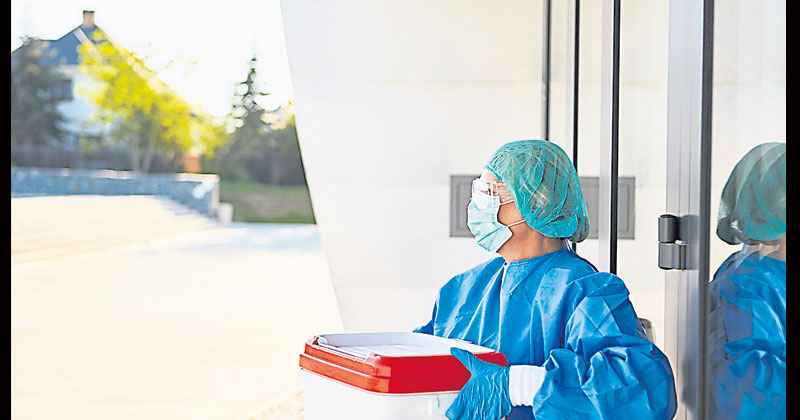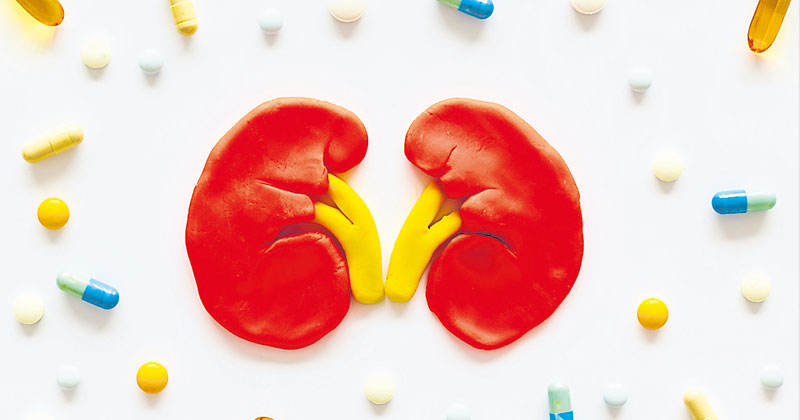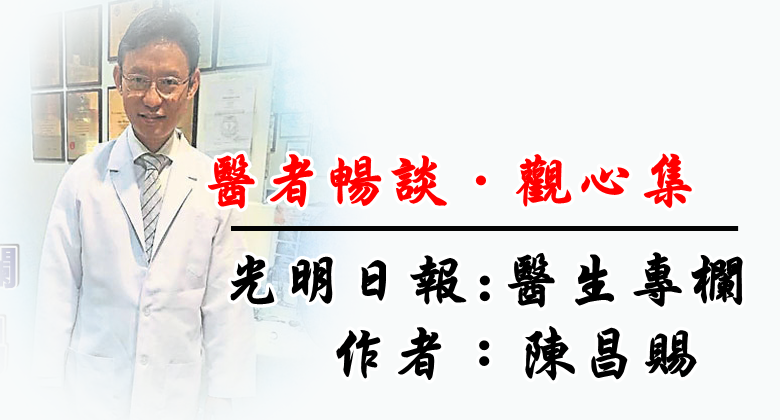【Local Medical】Healthy survival rate is better than kidney dialysis. Kidney replacement should be considered for renal failure

Text: Yang Qianni Organizer: Liang Yingxiu
Although dialysis therapy (commonly known as kidney dialysis), whether it is hemodialysis or peritoneal dialysis, can allow kidney friends to live a good and healthy life, it still has certain limitations, one of which is in terms of long-term complications.
Therefore, the best treatment is a kidney transplant.
(KUALA LUMPUR): Although dialysis therapy is effective in removing waste and excess water from the blood, it is not a perfect replacement for a functioning kidney. Therefore, kidney friends are still prone to chronic complications such as anemia, renal bone disease, heart disease and stroke.
In addition, they are also quite restricted in life, especially when it comes to work and travel. This is because dialysis is a process that is often repeated using specialized medical equipment, and patients undergoing hemodialysis need to visit the dialysis center 3 times a week, each time taking about 4 hours.
Chronic complications of long-term dialysis
Associate Professor Lim Soo Kun, Director of the Department of Nephrology at the University of Malaya Medical Center, pointed out that in terms of peritoneal dialysis, patients who use continuous portable peritoneal dialysis (CPAD) need to undergo dialysis 4 times a day, each time for 30 to 40 minutes; Automated peritoneal dialysis (APD) is performed once a day, usually 8 to 10 hours before going to bed.
Most importantly, in terms of survival, only about half of dialysis patients are alive 5 years after starting treatment.
“By comparison,
About 80% to 90% of patients with kidney failure who undergo kidney transplantation are still alive 5 years after surgery,
And the quality of life is much better, because they don’t need to be limited by the dialysis schedule,
Despite the need to take immunosuppressant (anti-rejection) drugs for life,
To prevent the body from rejecting the implanted kidney. “
Associate Professor Lin Shijun
(Associate Professor Lim Soo Kun)
Furthermore, the risk of chronic complications from dialysis treatment and loss of kidney function will also be eradicated. Especially younger patients may see reversal of infertility caused by kidney failure and be able to have children naturally.
Low rejection function of living kidney donation
In fact, patients with kidney failure may be considered for a reemptive kidney transplantation, that is, before starting dialysis.
“At UM Medical Centre, we usually try to bring this up when a patient is in stage IV chronic kidney disease, when the kidney function is less than 30%. This is because the longer the patient is on dialysis, the more complications develop. more, leading to lower outcomes of kidney transplantation. Nonetheless, kidney transplantation still has better outcomes than dialysis, even if the transplant is performed several years after the patient started dialysis.”
In kidney transplantation, there are two types of donors: living donors and deceased donors, he said.
“In Malaysia, living donors must provide their kidneys voluntarily (i.e. without incentives or compensation like money) and be related to the recipient such as a parent, spouse, sibling, or even a cousin. As of now, Living donors account for the majority of kidney donors in our country.”
“As far as the bulk donations are from registered organ donors, they are usually traffic accident victims who may have suffered very severe head injuries, leading to brain death, but the kidneys or other organs are still functioning normally.”
While any surgical procedure has risks, a living donor kidney transplant has the advantage that it is an elective surgery. This gives the medical team, patient and donor ample time to plan and prepare for the procedure.
“The risks of a kidney transplant are less serious than heart bypass surgery, but they are not as simple as an appendix operation. For example, the donor has a 30 in 100,000 chance of dying from the donor operation due to surgical complications, Slightly higher than being struck by lightning (1 in 100,000) or dying in a plane crash (10 in 100,000), but about three times lower than dying in a motorcycle accident (100 in 100,000).”
“The average hospital stay for a kidney transplant is about seven to 10 days after surgery, while donors can often be discharged home earlier, usually after three days. Today, the standard of care for donor surgery is minimally invasive laparoscopic surgery. “
In living kidney donation, lower doses of immunosuppressants are likely to be needed because if the parties are related, they share a certain amount of genetic material with the donor, reducing the chances of the recipient kidney being rejected by the body.
Because the donor will be evaluated to make sure he is healthy enough to undergo surgery, donated kidneys tend to maintain good function for a longer period of time, he noted. In fact, many voluntary donor parents insist on donating their “better” kidneys to their children, and doctors also follow the principle of protecting the health of kidney donors as a priority.
The golden time for general transplantation is 24 hours
In contrast, the “golden time” for transplantation with a usable kidney from a deceased donor is 24 hours. This includes identifying and bringing suitable recipients to the hospital, as well as time for the recipient and the medical team to complete all necessary surgical preparations.
As mentioned earlier, donated kidneys may also not be in ideal condition like living donors, since deceased donors are often brain-dead due to accidents, he said. Lack of shared genes, and recipients may require higher doses of immunosuppressants. Even so, long-term survival rates were high for transplant recipients who received gross kidney donations compared with those who continued on long-term dialysis.

7 hospitals in Malaysia available for kidney replacement
25,000 people donated
Although kidney transplantation is superior to dialysis in terms of the ultimate health and survival of patients with kidney failure, the number of such procedures is very small compared to the need. Why?
Lin Shijun pointed out that a total of 151 kidney transplants were performed in 2020, most of which were from living donors. Currently, there are 7 hospitals in Malaysia that perform kidney transplantation, namely Kuala Lumpur General Hospital, Selayang Hospital, UM Medical Center, UiTM Hospital, Prince Court Medical Center, Sunway Medical Center and Malacca Charity Hospital.
Waiting for kidney donation for more than 10 years
At present, about 25,000 patients with kidney failure are waiting to donate their kidneys, accounting for about half of the number of dialysis patients in my country. There are only about 50 gross organ donations per year, and the wait time for a kidney is usually more than 10 years.
While the Malaysian Kidney Allocation System (MyKAS) usually operates on a first-come, first-served basis based on years of dialysis, it prioritizes patients who are younger and non-diabetic as they will achieve the best outcome from a kidney transplant.
Live kidney donation is simple and beneficial
He emphasized that as a doctor, it is strongly recommended that patients with kidney failure consider kidney replacement, and it is best before kidney failure. The support of your family is crucial because living kidney donation is quicker, easier and more beneficial than gross donation. And he also strongly encourages healthy citizens to register as organ donors, because they can give the “gift of life” to patients with kidney failure and those who need other organs.

Cannot stop taking anti-rejection drugs
Question 1:After a kidney transplant, is there a day when I stop receiving immunosuppressant therapy?
Answer 1:The dose of the medicine may be reduced, but you can never stop taking the anti-rejection medicine. Even decades after your transplant, your immune system will still be able to recognize and reject your donated kidney as “foreign.”
Different blood types can donate kidneys
Question 2:Donor and recipient must have the same blood type for a kidney transplant?
Answer 2:Blood type or ABO incompatible kidney transplantation (ABO-incompa tible kidney transplantat) has been performed in Malaysia since 2011. Recipients simply undergo an additional procedure prior to transplant, known as plasma exchange or immunoadsorption, to ensure that any antibodies against the donor’s blood type are removed.
All religions allow organ donation
Question 3:Are there any religions that forbid organ donation after death?
Answer 3:Organ donation is permitted in all religions, as physicians have demonstrated in numerous meetings with religious leaders across our country.
Follow healthy life after surgery
Question 4:Can I go back to my normal lifestyle after a transplant?
Answer 4:While your diet will certainly not be as restrictive as before, you will still need to follow a healthy lifestyle and diet to ensure your kidney (and the rest of your body) is functioning well.
It is best to talk to a nutritionist or dietary therapist about the definition of a healthy diet, because many people tend to eat too much salt, too little fruits and vegetables, and too much meat, even though they think their diet is healthy.
Donors should have an annual physical examination
Question 5:Does the role of being a donor end after the transplant?
Answer 5:Even if the donor feels perfectly healthy, it’s important to see a doctor for a physical at least once a year.
This is to detect and address any health issues as early as possible, such as high blood pressure, diabetes, proteinuria or decreased kidney function, as they only have one functioning kidney and thus have less reserve capacity.


![[Love Wants Sexual Happiness Series 358]Find the culprit and overcome psychogenic erectile dysfunction. Don’t let pressure affect your sexual happiness. [Love Wants Sexual Happiness Series 358]Find the culprit and overcome psychogenic erectile dysfunction. Don’t let pressure affect your sexual happiness.](https://webcdn.guangming.com.my/wp-content/uploads/2024/04/171111-780x420.jpg)

![[Wanqingyi Care]My health, my rights, customized medical methods in the last stage of life [Wanqingyi Care]My health, my rights, customized medical methods in the last stage of life](https://webcdn.guangming.com.my/wp-content/uploads/2024/04/ZZ1-100-780x420.jpg)
![[Kidney Transplantation Special Topic]The survival rate of transplanted kidneys is high without dialysis treatment three times a week [Kidney Transplantation Special Topic]The survival rate of transplanted kidneys is high without dialysis treatment three times a week](https://webcdn.guangming.com.my/wp-content/uploads/2024/04/1311-780x420.jpg)



